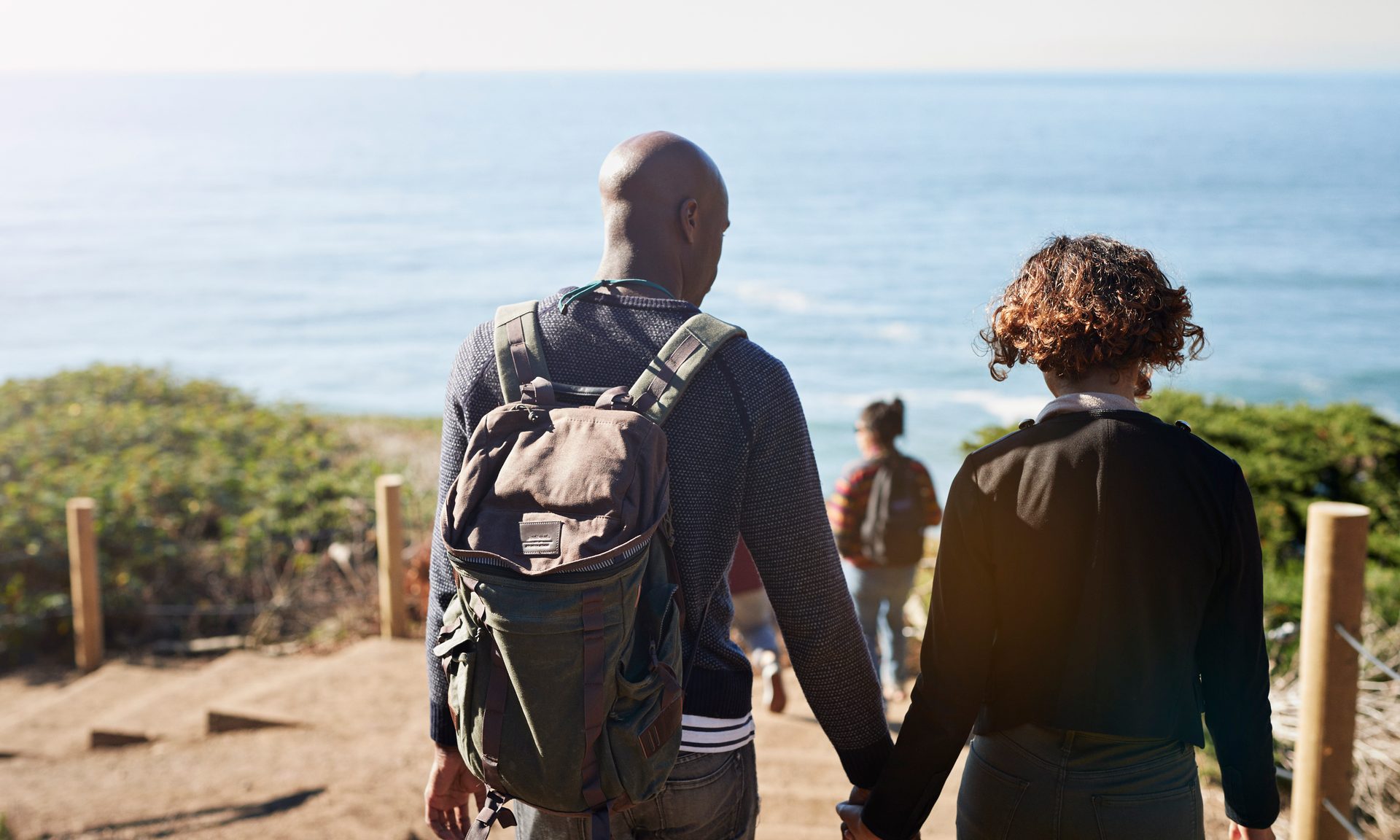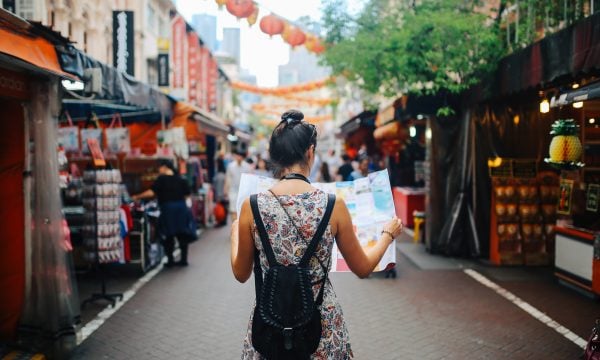The Majority of Americans Plan to Travel in 2022
A new study finds that COVID-19 safety measures are still important to most travelers planning vacations in 2022.

Many or all of the products on this page are from partners who compensate us when you click to or take an action on their website, but this does not influence our evaluations or ratings. Our opinions are our own.
Traveling during the COVID-19 pandemic is still a divisive topic for some Americans. In the post-vaccine era, some Americans are making travel plans, while others continue playing it safe. Regardless of where they stand on travel, over half of Americans (62%) agree they would feel more comfortable traveling if certain COVID-19 precautions were in place, according to a new NerdWallet survey conducted online by The Harris Poll.
In the survey of more than 2,000 U.S. adults, we asked Americans how the COVID-19 pandemic is impacting travel plans. Even with some discomfort around traveling, Americans plan to take two leisure trips, on average, in the next 12 months.
Key findings
- Exposure to COVID-19 impacted travel plans in 2021: Of Americans who had plans to travel in 2021 and either they or someone in their household tested positive for COVID-19 or was exposed to it, two-thirds (66%) say their travel plans were impacted by the exposure.
- The majority of Americans have plans to travel in the next 12 months: Seven in 10 Americans (70%) plan to take a leisure trip in the next 12 months. Nearly half of Americans (47%) are planning to take two or more leisure trips within that time frame.
- Many are saving points and miles for travel: Nearly one quarter of Americans who have a travel rewards credit card (23%) are saving points or miles to pay for a luxurious or special occasion trip; 17% are saving them to pay for an international trip; and 16% are saving them because they want to visit a destination not currently accepting tourists due to the COVID-19 pandemic.
- Many Americans would feel more comfortable traveling with COVID-19 safety precautions in place: A little over 3 in 5 Americans (62%) say they would feel more comfortable traveling right now if precautions such as these were in place: hotels were sanitized between guests (38%); airplanes were sanitized between flights (37%); hotel staff were required to be vaccinated (30%); airline employees were required to be vaccinated (29%); or rapid tests were widely available (28%).
- The coronavirus is still a reason why some avoid travel: About half of Americans who don’t plan on traveling for leisure in the next 12 months (51%) say their reasons are COVID-related.
COVID-19 exposure disrupted some travel plans in 2021
Of Americans who had travel plans in 2021 and they or someone in their household tested positive for COVID-19 or was exposed to it, two-thirds (66%) say their travel plans were impacted by the exposure. While some Americans had to extend their stays at destinations to quarantine, others had to cancel their trips.
Of those exposed travelers, almost 1 in 5 (19%) say they used a credit card to extend their stay at their destination to quarantine, and 17% say they used travel rewards points or miles to extend their stay to quarantine. Slightly over 1 in 7 (15%) say they canceled their trip and filed a claim to use their credit card’s trip cancellation benefits, and 13% canceled their trip and filed a claim with their travel insurance provider.
“Protecting your trip in some way can come in handy when things don’t go as planned,” says Sara Rathner, a travel expert at NerdWallet. “A travel rewards card with built-in coverage for trip cancellation or interruption comes at no additional cost beyond the annual fee, and it might be exactly what you need. If a separate travel insurance policy is more appropriate for you, know that you need to purchase it out-of-pocket as an add-on.”
How COVID-19 is impacting travel in 2022
Seven in 10 Americans (70%) are planning leisure travel in 2022, but many (30%) are not. Of those who don't plan on traveling for leisure in the next 12 months, about half (51%) cite COVID-related reasons for staying put. Respondents were allowed to choose more than one reason for not traveling.
Non-travelers
Of those who aren’t planning on traveling for leisure in the next 12 months, over one-third (37%) say it’s because they don’t feel safe traveling due to current or future COVID variants; 19% say it’s because they are concerned about COVID-19 case rates at their planned destinations; and 12% say it’s because the COVID-related restrictions at their desired destinations are a hassle.
Among those not planning on traveling for leisure in the next 12 months, baby boomers (ages 58-76) are more likely to avoid travel for COVID-related reasons than are members of later generations. A little over 3 in 5 baby boomers (61%) cite COVID as a reason for not planning travel, versus 45% of millennials (ages 26-41) and 43% of Generation Xers (ages 42-57).
Other potential non-travelers may include individuals who are building up a stash of travel rewards, as some travel credit card holders are saving points and miles for COVID-related reasons. Close to a quarter of travel credit card holders (23%) are saving travel rewards because they don’t feel safe traveling yet due to the pandemic, and around 1 in 6 (16%) want to visit a destination not currently accepting tourists due to the pandemic.
“Having a large stash of points or miles means you’ll be able to book lower-cost travel whenever you feel ready to get back out there,” Rathner says. “But don’t ignore your points until right before you need them. With some rewards programs, points can expire or lose value over time.”
Travelers
Americans plan to take two leisure trips, on average, in the next 12 months. Generation Z members (ages 18-25) and millennials are more likely than members of earlier generations to plan more than one leisure trip in the next 12 months (60% of Gen Zers and 58% of millennials, versus 41% of Gen Xers and 40% of baby boomers.)
Some Americans are also stashing away points or miles, in some cases for travel. Slightly more than three-quarters of Americans who have a travel rewards credit card (77%) are accumulating travel rewards rather than using them.
Nearly one quarter of Americans who have a travel rewards credit card (23%) are saving points or miles to pay for a luxurious or special occasion trip; a similar proportion (23%) are not saving at all, and are redeeming points or miles as they earn them. Around 1 in 6 (17%) are saving their travel rewards to pay for an international trip.
COVID-19 safety measures would make most Americans more comfortable with travel
According to the survey, a little over 3 in 5 Americans (62%) say they would feel more comfortable traveling if certain COVID-19 safety precautions were in place. Slightly over 1 in 5 Americans (23%) say they currently feel comfortable traveling, whereas 15% say that nothing would make them comfortable traveling right now.
Gen Zers and millennials are more likely than baby boomers to say they would feel more comfortable traveling right now if rapid tests became widely available (35% of Gen Zers and 32% of millennials versus 24% of baby boomers). Baby boomers are more likely than members of later generations to say that nothing would make them feel more comfortable traveling right now (20% of baby boomers versus 6% of Gen Zers, 9% of millennials and 14% of Gen Xers).
The pandemic has changed the way some Americans travel
Over half of Americans (56%) say that the way they travel has changed since the COVID-19 pandemic began. Meanwhile, 28% say the way they travel hasn’t changed at all, and 16% of Americans say they never travel at all.
Among those parents of children under 18 who say the way they travel has changed since the start of the pandemic, more than 1 in 3 (36%) are only traveling to destinations that are low-risk for COVID-19, and slightly over 3 in 10 (32%) say they have stopped going on international trips and now only travel domestically.
Nerdy travel tip: “For the foreseeable future, COVID has dramatically changed the way many of us plan our vacations by adding new layers of complications,” Rathner says. “Have backup plans at the ready. Know if you need to get tested or show proof of vaccination, for example, so you’ll be prepared and won’t waste precious vacation time dealing with surprise issues.”
How travelers can prepare for disruptions in the COVID era
It’s important to be prepared in case you or someone in your household or traveling party is diagnosed with COVID-19 or exposed to it. These disruptions can occur before or during a trip, leading to cancellations or an extension if you have to quarantine.
By planning ahead, you can keep debt at bay or more money in your pocket when the unexpected strikes. Here are a few strategies to consider before booking travel:
Factor emergency expenses into your travel budget. If you don’t already have an emergency fund, or if it’s a modest one, build a backup fund into your travel budget for possible quarantine expenses like an extended hotel stay, meals and medications.
Save points or miles for possible quarantine expenses abroad. Assuming your credit card’s points or miles don’t have blackout dates or other limitations, these rewards could help you save money if they can cover unexpected travel expenses. Read over the terms and conditions of your rewards program to understand how and when you can use your rewards.
Book flights and accommodations with flexible cancellation policies. You can protect the value of a vacation by strategically booking a flight, rental car or hotel that has a flexible cancellation policy. If you have to cancel a flight, for instance, an airline may provide a travel credit that can be used at a later time. Read the terms of the cancellation policy carefully to understand how late you can change your plans and what type of compensation to expect.
Book travel with a credit card that offers trip cancellation and interruption insurance. Trip cancellation insurance may reimburse prepaid, nonrefundable travel expenses like airfare, hotels, cruises, tours and passenger fares, depending on the card’s terms. If you have to cut your trip short and return home, trip interruption insurance may reimburse you for the unused portion of your trip for certain covered reasons. Terms vary. To qualify for these benefits, you must pay for eligible travel expenses with a credit card that offers them. If you use credit card rewards to pay for a trip, your purchase might still be covered, depending on the card and issuer. Look through your travel credit card’s terms to understand how the insurance benefits may apply.
Buy travel insurance for expensive trips. If your credit card doesn’t offer trip cancellation or interruption insurance, or you can’t get a flexible cancellation policy, consider getting stand-alone travel insurance for a pricey trip. Make sure the policy covers COVID-related expenses, or look into adding Cancel For Any Reason coverage to your insurance policy. With these options, you’re more likely to get a good chunk of your money back if you file a claim.
Keep a backup payment method handy. In addition to building an emergency fund into your travel budget, it doesn’t hurt to have some cash and an additional credit card for expenses that you may have forgotten to factor in, like medications, COVID-19 tests or holiday or weekend rates at hotels. A credit card that belongs to the Visa or Mastercard network is widely accepted abroad and can be a safer backup payment method than a large sum of cash. And if you can pay it off immediately upon returning home, you may be able to avoid interest charges.
“Travel is still full of uncertainty, but that doesn’t mean it’s impossible if you plan for the unexpected. Give yourself time to plan your trip and build flexibility into your bookings,” Rathner says. “And on the day of travel, get to the airport or hit the road early, especially during peak times. We’re all a little out of practice, so that extra time can help lower your stress.”
METHODOLOGY
This survey was conducted online within the United States by The Harris Poll on behalf of NerdWallet from Feb. 3-7, 2022, among 2,012 U.S. adults ages 18 and older. This online survey is not based on a probability sample and therefore no estimate of theoretical sampling error can be calculated. For complete survey methodology, including weighting variables and subgroup sample sizes, please contact Lauren Nash at [email protected].
Disclaimer: The information used and statements of fact made are not guarantees, warranties or representations as to their completeness or accuracy. Use or reliance on this information is at your own risk and does not constitute information associated with the present or future performance of NerdWallet or any of its affiliates or subsidiaries. NerdWallet disclaims, expressly and impliedly, all warranties of any kind, including those of merchantability and fitness for a particular purpose or whether the information is accurate or reliable or free of errors. Statements that are not historical facts are forward-looking statements that involve risks and uncertainties as indicated by words such as “believes,” “expects,” “estimates,” “may,” “will,” “should” or “anticipates” or similar expressions. These forward-looking statements may materially differ from NerdWallet’s presentation of information to analysts and its actual operational and financial results.
Article sources
NerdWallet writers are subject matter authorities who use primary,
trustworthy sources to inform their work, including peer-reviewed
studies, government websites, academic research and interviews with
industry experts. All content is fact-checked for accuracy, timeliness
and relevance. You can learn more about NerdWallet's high
standards for journalism by reading our
editorial guidelines.
Limited Time Only: Earn $1,000 Toward Travel!
Capital One Venture Rewards Credit Card 
Travel

For a limited time, the
Capital One Venture Rewards Credit Card is offering new cardholders an especially rich bonus: Enjoy $250 to use on Capital One Travel in your first cardholder year, plus earn 75,000 bonus miles once you spend $4,000 on purchases within the first 3 months from account opening - that’s equal to $1,000 in travel!
More like this
Related articles







